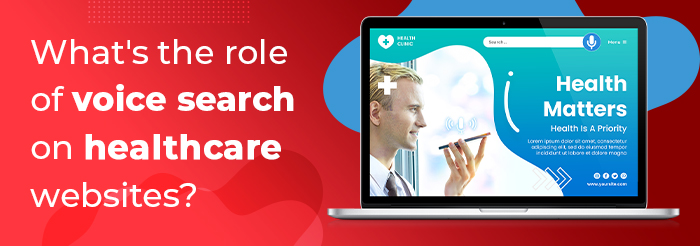What’s the role of voice search on healthcare websites?
Posted on ,
The modern world is very fast and demanding in terms of the time and effort we need to put into our jobs, families, and friends. Given how busy individuals are these days, it may seem ridiculous to dedicate time to writing a tone of text in a desperate attempt to find that one video, song, advice, or article you’ve been looking for. Voice search is the technology we think will completely change the way we get information because of how convenient it is and how easily it can be incorporated into our daily lives.
Healthcare marketing, our primary field of focus, can greatly benefit from this trend, as voice search optimization can improve the patient experience and boost engagement to a level we’ve never seen before, as well as help people who need help but can’t type text on their phone or laptop.
With years of expertise in healthcare marketing, our team will put in as much effort as possible to explain to you why voice search optimization is one of the primary focuses of healthcare marketing at the moment and why we believe in its potential so much. Let’s begin by finding out what the voice search’s purpose is on healthcare websites and looking at some practical ways to use it.
Overview of Voice Search Optimization in Healthcare Marketing
Voice search is gaining popularity as a useful, hands-free way to look for information. Because voice search makes medical information way easier to get, understand, and use, it offers particular potential for patient interaction in the context of healthcare marketing.
Voice commands are being used by patients more often to find healthcare providers, schedule appointments, and ask questions about symptoms and treatments as a result of the growing popularity of virtual assistants like Alexa, Siri, and Google Assistant in our daily lives. Healthcare organizations need to adjust their digital marketing strategies to meet the rising need for voice-driven communication.

Why People Prefer Voice Search
Voice search is widely used due to its convenience and ease of use. Instead of entering questions into Google or some other search engine, users may say them aloud, which speeds up the process, makes it way easier to adjust your request to your needs, and helps the operation’s natural flow. This hands-free solution is highly appealing when multitasking or driving, for example, when typing is not acceptable.
Voice search is appealing to people of all ages, including the elderly and those with disabilities who might find traditional typing challenging. By meeting these broad user preferences, healthcare websites may become way more important because of their ability to provide instruction in risky situations and connect patients with doctors quickly with the help of voice search.
The Benefits of Voice Search Optimization
Optimizing your healthcare website for voice search can bring some nice benefits:
- Positive User Experience: Finding data is much more convenient and always available thanks to voice search, which offers a more intuitive and personalized experience.
- Better SEO: When you try to ask a voice search for help, it performs better when you use the right phrases and keywords. Optimizing the responsiveness of your website for modern natural language will help you improve its search engine results.
- Boost of Website Traffic: Your medical website will draw in more visitors who are interested in voice search because it is gradually starting to become popular, and if you play your cards right and create a nice voice search marketing strategy, you can turn these random visitors into clients. Just remember, the feature must work well; if it has a lot of bugs and doesn’t work properly, it may damage your brand image.
- A huge improvement in providing services for immobilized people: Voice search enables people who, due to certain circumstances, cannot type text to receive the help and information they need in various life situations.
A Scheme for Optimizing for Voice Search
To use the features of voice search in healthcare marketing, follow these strategic steps:
Target relevant keywords
Targeting certain long-tail keywords and chat phrases that closely match patient requests is crucial for success in voice search marketing. Usually, when you are training to find some information about your health, the words you are using have to be very specific, because it takes time and effort to rephrase everything if you fail. Voice search is the way to deal with it. You can look for synonyms or ask for options that may be what you are looking for.

Approach: Try to organize voice searches on your website so regular symptoms and conditions are very easy to describe. You should also think about adding some kind of feature that will ask a person if they want to hear what kind of condition they may be having after they list their symptoms (a good idea will always be to always advise contacting a doctor, as regular conditions may become way more complicated if treated poorly).
There are apps and tools, completely free to use, that can help you find keywords and questions that people use and ask. Google’s Keyword Planner is a great example. Remember, regular voice searches will include long words, synonyms, and lots of phrases that will try to help the assistant get an idea of what a person is looking for.
Choose everyday language instead of professional style
To improve voice search on your website, focus on what patients say in their daily lives. Remember, most people are not doctors, and they are not related to your field. Instead of using complex medical jargon, choose clear language that your target audience will understand. If you plan and optimize everything, thinking about your potential patients, your website will become the go-to place for users who want to find answers, not spend hours trying to find the right words.
Approach: Post and update your content while making sure it is built around the language we all use in our everyday lives. If you use too much expert terminology, it will be hard and even sometimes scary to read your content, as sometimes in healthcare conditions that we all believe are common, sound kind of rerrifying on “doctor’s slang.”.
Focus on user-oriented design
A responsive and user-friendly website is necessary for voice search optimization to be effective. Due to the rising number of voice assistants on mobile devices, make sure your website is functional on every platform and device.

Approach: Navigation on your website shouldn’t take too much time to understand, and you should also optimize the design for comfortable reading on a smaller monitor. Make sure your design is responsive, so it adapts to every device screen possible.
Example: Incorporate “click-to-call” or “remind me later” buttons for easy appointment scheduling and optimize forms for input on different devices.
Optimize website speed
When optimizing a website for voice search, speed is crucial and often overlooked, which causes SEO losses. Websites that load quickly typically have better search engine rankings, which improve the user experience and lower bounce rates. Make the speed optimization of your website a priority to guarantee fast loading times on any device.
Approach: Conduct regular performance audits using tools like Google PageSpeed Insights. There are also things you can do, such as speed up loading time and use optimizations like image compression and browser caching, so at the end of the day, your website will perform way more smoothly.
Aim for a load time of less than three seconds to provide a positive experience, particularly for mobile users.

Example: Aim for a load time of under three seconds to provide a seamless browsing experience, especially for mobile users.
Include local SEO strategies in your plan
Voice searches usually contain words, names, or questions specific to a location or area. That is why local SEO strategies are the best option for optimizing the search process. Use location-based keywords and make sure all online directories, commercials, and platforms have correct and consistent business information.
Approach: Claim and optimize your Google My Business listing with up-to-date contact information, business hours, and customer reviews. Don’t forget about local keywords such as city names or neighborhood references within your content.
Example Keywords: “Best chiropractor in [City]”, “Emergency dental services near [Location]”, “Neurosurgeon clinic open on weekends”
Additional tip: Gather reviews and feedback
Don’t make your online reputation just a loud noise; ask patients to leave reviews and answer them quickly and in a polite manner.
Healthcare practices need to think twice before keeping their strategies the same, because in order to be competitive and relevant, it may not be an option. As voice search as well as other trends keep changing digital marketing for every field, especially healthcare, we believe the way to go is to adapt. Adopting voice search optimization will help you make your healthcare services user-friendly for patients, as well as increase the number of positive interactions with your brand.
Conclusion
To sum everything up, voice search is an exciting innovation that is about to show the world its potential pretty soon. You can stay skeptical, or you may boost patient interactions, boost your online visibility, and maintain an advantage in the changing field of digital healthcare marketing.
Are you prepared to include voice search in your marketing plan? Reach out to us right now to find out whether your website is prepared to take advantage of everything that modern technology has to offer.

 Why Good communication Matters in Healthcare
Why Good communication Matters in Healthcare De-Escalation Tips for Handling Aggressive Patient..
De-Escalation Tips for Handling Aggressive Patient.. Reaching The Right Audience Through Target Marketi..
Reaching The Right Audience Through Target Marketi..